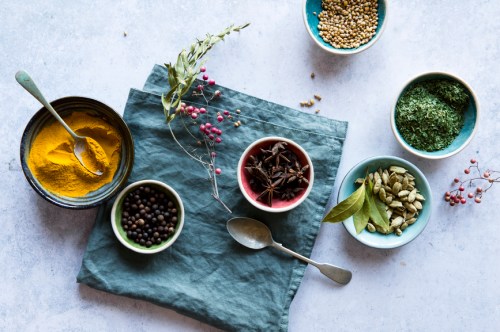‘I’m an Herbalist, and These Are The Top 5 Types of Herbs To Help With Sleep, Stress, Digestion, and Skincare’
In this episode of 'Plant Based' with Rachelle Robinett, learn herbalism for beginners including the 5 most helpful categories of plants.

One question that herbalist and Supernatural founder Rachelle Robinett gets all the time: “Where do I start with herbalism?” If you’re curious about the therapeutic and medicinal use of plants, this episode of Plant Based is a great place to start. As any good herbalist will tell you, a cup of tea or a tincture isn’t going to fix everything. Herbalism is a full-spectrum holistic practice, and it’s not about treating symptoms—it’s about treating the entire human and the underlying cause of the symptoms.
Experts in This Article
registered herbalist, educator, and founder of Supernatural
“The use of nature as a remedy for life is not new; it is global and historic,” Robinett says. “We have been evolving with plants forever. There are 30,000 medicinal plants around the world that we know of today… [and] we’re discovering about 2,000 more plants every single year. These are plants that can be used as food, as medicine, and as both.” So, yeah, there are many categories of plants.
Here, Robinett takes us through the five plants that she thinks are the most common and the most helpful. You can read the Cliff’s Notes version below, but be sure to press play on the video to go in depth.
1. Adaptogens
“I have done many a Plant Based episode on adaptogens. So I highly encourage that you check those out for more detail about this category of herbs,” Robinett says. Adaptogens help us recover from stress in a calmer, more effective way, and allow us to become more resilient to it over time, she explains.
Examples: ashwagandha, rhodiola, reishi
2. Astringents
Essentially, astringents are toning plants—the most well-known one probably being witch hazel. “These are things that we would use as topical treatments, or internal treatments on our digestive system,” says Robinett. Astringents also help strengthen the skin barrier and protect moisture balance.
Examples: witch hazel, rose petals, green tea
3. Aromatics
Robinett explains that these plants are incredibly beneficial for a number of reasons. “[Aromatics] are plants that tend to be perfect to have in your beginner medicine cabinet or your first tea collection, because they’re just going to help in so many different ways,” she says. Think: improving digestion, energy levels, easing cramping and discomfort, and relaxing the muscles.
Examples: mint, lavender, holy basil
4. Bitters
“I love this this category—I believe in it so strongly and I really do think there’s an amazing future for it,” Robinett says. She explains that the most common way to use bitters is to support digestion before you eat; bitters help you digest and absorb your nutrients more effectively.
Examples: arugula, orange peel, gentian
5. Nervines
“Nervines are also my favorite,” Robinett says. “These are herbs that love our nervous system. And these are plants that tend to work more quickly than adaptogens.”
That’s one of the key reasons why Robinett loves nerviness: She explains that though adaptogens are great foundation builders, they need to be used for a long time. Nervines work if you need support immediately. “The neat thing about nervines is that some of them are daytime-use plants, and some of them… you would use at night for sleep, or for deeper relaxation if you’re feeling very anxious and you need to calm down. So there’s a whole variety of them,” Robinett explains.
Examples: lavender, lemon balm, California poppy
The bottom line on herbalism for beginners
“Remember that the place to start is to know the cause of your symptoms. And if you don’t have any symptoms, choose a focus and explore that category of herbs,” Robinett says. As with anything, she highly recommends starting off slow, consulting with your healthcare practitioner if you’re using any kind of medication, and, of course, stop if you notice any adverse reactions.
Oh hi! You look like someone who loves free workouts, discounts for cutting-edge wellness brands, and exclusive Well+Good content. Sign up for Well+, our online community of wellness insiders, and unlock your rewards instantly.
Sign Up for Our Daily Newsletter
Get all the latest in wellness, trends, food, fitness, beauty, and more delivered right to your inbox.
Got it, you've been added to our email list.










